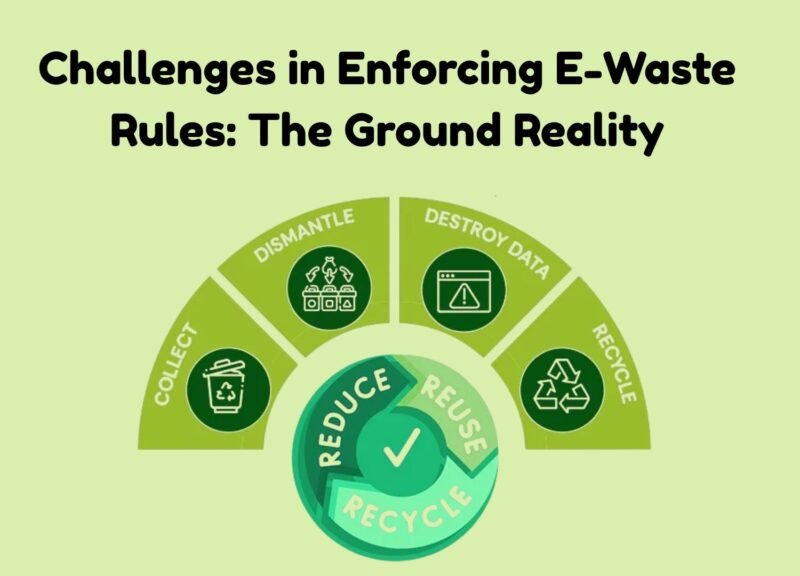Challenges in Enforcing E-Waste Rules: The Ground Reality- ”Strong on paper, weak on pavement — that’s India’s e-waste story.
India’s rapid digital growth has come at an environmental cost — a surge in discarded electronic gadgets and devices that form mountains of electronic waste (e-waste). According to the Central Pollution Control Board (CPCB), India generated over 1.6 million tonnes of e-waste in 2023, making it one of the top three generators in the world. While the E-Waste Management Rules (2016) and the E-Waste (Management) Rules, 2022 provide a comprehensive framework to manage this growing crisis, enforcement on the ground tells a very different story.
This article dives deep into the ground realities — from informal recycling networks to policy loopholes — that make enforcing e-waste rules one of India’s toughest environmental challenges.
The Dominance of the Informal Sector
More than 90% of India’s e-waste is handled by informal recyclers, including kabadiwalas and small scrap shops. These players operate outside the legal framework, using crude and unsafe recycling methods such as acid baths, open burning, and manual dismantling. While they employ thousands, they also create severe environmental and health hazards.
Challenges in Enforcing E-Waste Rules: The Ground Reality, on the other hand, face multiple compliance requirements, high costs, and bureaucratic hurdles. Without financial incentives or integration programs, most informal recyclers remain disconnected from the formal system.
Weak Institutional Capacity: Challenges in Enforcing E-Waste Rules: The Ground Reality
The enforcement of e-waste rules depends largely on the CPCB and State Pollution Control Boards (SPCBs). However, both institutions are understaffed, underfunded, and technologically under-equipped. Many SPCBs lack dedicated e-waste monitoring teams. Inspections are infrequent, and penalties for violations are rarely imposed.
This lack of capacity results in poor data collection, inconsistent implementation, and weak accountability at every level of enforcement.
Infrastructure and Collection Gaps
India’s recycling infrastructure remains concentrated in a few urban centers such as Mumbai, Delhi, Chennai, and Bengaluru. Large parts of northern and northeastern India have limited access to authorized recycling or collection facilities. This geographical imbalance increases transport costs and discourages proper disposal.
Moreover, producers obligated under Extended Producer Responsibility (EPR) often struggle to establish effective collection systems, leading to underreporting and non-compliance.
Policy Loopholes in the E-Waste Rules 2022
While the E-Waste (Management) Rules, 2022 modernized waste tracking by introducing a digital EPR credit system, they also created new loopholes. The removal of the ‘bulk consumer’ category exempted many large e-waste generators from compliance. Furthermore, the lack of third-party audits allows producers to misuse EPR credits without actually meeting their recycling targets.
The enforcement mechanism also lacks a strong deterrent — fines are small compared to the cost of compliance, encouraging industries to bypass regulations.
Data Deficiency and Poor Transparency
Reliable data is the foundation of effective enforcement. Yet, the CPCB’s EPR portal suffers from poor data uploads, manipulation, and missing records. Many recyclers inflate figures to meet producer targets, while unregistered operators work entirely off the books.
This opacity prevents policymakers from measuring real progress and identifying systemic weaknesses.
Economic and Market Constraints
Formal recycling in India is expensive and offers limited financial returns. Recovering valuable metals like gold and copper requires advanced technology, which small recyclers cannot afford. Meanwhile, informal recyclers cut corners by ignoring safety and environmental regulations, making them more profitable.
Unless the government introduces financial incentives, subsidies, or tax benefits, formal recyclers will continue to struggle, and enforcement will remain weak.
Illegal Imports and Transboundary Challenges
Despite bans, India continues to receive illegal e-waste shipments disguised as used electronics or donations. Weak customs screening and poor inter-agency coordination make it easy for such shipments to enter the country. Once inside, these goods often end up in informal recycling clusters, worsening domestic waste management challenges.
This also violates India’s commitments under the Basel Convention, which regulates transboundary waste movement.
Low Consumer Awareness: Challenges in Enforcing E-Waste Rules: The Ground Reality
Enforcement cannot succeed without public participation. Yet, most consumers remain unaware of proper e-waste disposal channels. Surveys by TERI and CPCB show that over 60% of consumers prefer selling old electronics to local scrap dealers rather than depositing them at authorised collection centres.
Without mass awareness campaigns and convenient collection mechanisms, consumer behavior remains a major roadblock to rule enforcement.
Human and Environmental Costs
Weak enforcement doesn’t just lead to policy failure — it causes real harm. Informal recyclers work without protective equipment, inhaling toxic fumes and handling lead, mercury, and cadmium. Many suffer from chronic illnesses and reduced life expectancy.
Environmental damage is equally alarming. Toxic runoffs from unregulated recycling contaminate soil and groundwater, turning e-waste into a silent ecological disaster.
The Way Forward: Challenges in Enforcing E-Waste Rules: The Ground Reality
To transform e-waste laws from mere paper frameworks into real impact, India must adopt a holistic strategy that blends policy reform, technology adoption, and behavioral change.
Key Recommendations: Challenges in Enforcing E-Waste Rules: The Ground Reality
- Integrate the informal sector through licensing, training, and micro-finance support.
- Digitize and audit EPR data using blockchain or third-party verification.
- Strengthen SPCBs and CPCB with more manpower, funding, and monitoring tools.
- Offer financial incentives for formal recyclers to encourage compliance.
- Promote public awareness through nationwide campaigns and incentive programs for responsible disposal.
Conclusion: Challenges in Enforcing E-Waste Rules: The Ground Reality
The enforcement of e-waste rules in India is a classic example of the gap between intent and execution. While the laws are progressive, the ground realities — weak institutions, economic disincentives, and public apathy — continue to undermine their success. Challenges in Enforcing E-Waste Rules: The Ground Reality.
Until enforcement becomes as strong as the laws themselves, India’s e-waste management story will remain, as the punchline goes — strong on paper, weak on pavement.
FOR MORE BLOGS – beyondthepunchlines.com

 Add to favorites
Add to favorites






